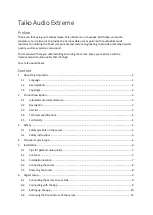
Appendix B
Configuration Aspects for Programmers
ChartScan User’s Manual
B-9
CSN14/HV/S
Configuring High Volts Channels
When the CSN14/HV/S signal conditioning module is used, ChartScan measures high voltages providing a
programmable range per channel. To configure the channels on a CSN14/HV/S, use the Configure Channel (
C
)
command to assign a range to each channel on the signal conditioning module. Channels not included in the
channel scan do not have to be configured.
In addition to channel type, each channel in the scan can optionally have a high and low alarm level and
hysteresis associated with it. ChartScan’s alarms allow the unit to produce an internal event when the value of a
channel is outside of desired limits. These alarm events can be used as trigger or stop events, or as a stimulus
for TTL-level signals on ChartScan’s back panel. More information on using alarms appears later in this
appendix, in the section
Configuring Alarms
.
The CSN14/HV/S supports both DC and AC voltages. Simply select the desired channel type during
configuration.
Type
Volts DC
Type
Volts AC*
20
± 2.5 V
28
2.5 V
21
± 25 V
29
25 V
22
± 250 V
30
250 V
*
Note:
Above mentioned ranges are maximum peak-to-peak signals for AC volts.
Vrms values are accurate to 70.7% of peak value.
The
type
parameter is what distinguishes the channel as a high volts channel. The channel configuration
cannot be changed while the trigger is armed or an acquisition is taking place.
Note:
Additional information can be found under the command reference for
C
in
Appendix A.
Scan Configuration
Configuring a Scan
Although 128 channels are available for scanning when an expansion chassis is added to the ChartScan unit,
only those channels configured in the channel scan are collected and available to the controlling computer.
Channels are always scanned in ascending order, regardless of the sequence you input. The same configuration
is used in reading channel data through the High/Low/Last Registers or the Acquisition Buffer.
Scan configuration is also accomplished using the Configure Channels,
C
command. This command allows up
to 128 channels to be specified by either assigning individual channels or entering a range of channels. The 128
possible channels can be configured in any sequence, but the scan will be ordered sequentially by ChartScan.
Note:
Channels cannot be accessed randomly as part of a channel scan.
Configuring the Scan Interval
The scan interval is the frequency at which the scans are acquired. It can be programmed via the Set Scan
Interval (
I
) command from a 99-hour period down to as fast as the unit can run under the current channel
configuration. The normal scan interval can be programmed in increments of 0.1 seconds.
ChartScan has two distinct scan intervals:
•
First, is the
normal
scan interval. This scan interval is used when ChartScan is collecting scans before the
start event has occurred or after stop event has occurred. These two regions are called the
pre-trigger scan
and the
post-stop scan
, respectively.
•
Second, is the
acquisition
scan interval. This scan interval is used when ChartScan is acquiring scans after
the start event has occurred but before the stop event has occurred. This region is referred to as the
post-
trigger scan
.
Summary of Contents for OMB-CHARTSCAN 1400
Page 1: ...August 2002 OMB CHARTSCAN 1400 Portable Data Recorder p n OMB 483 0901 Rev 3 1...
Page 6: ...iv ChartScan User s Manual...
Page 24: ...ChartScan User s Manual...
Page 32: ...2 8 General Information ChartScan User s Manual Notes...
Page 56: ...3 24 ChartScan User s Manual Notes...
Page 124: ...6 20 Calibration ChartScan User s Manual...
Page 126: ...A ii ChartScan User s Manual...
Page 136: ...API Commands Appendix A A 10 ChartScan User s Manual Notes...
Page 176: ...API Commands Appendix A A 50 ChartScan User s Manual...
Page 230: ...Appendix C Registers Data Formats Queries ChartScan User s Manual C 13...
Page 237: ...Registers Data Formats Queries Appendix C C 20 ChartScan User s Manual Notes...
Page 257: ...E 2 ChartScan User s Manual Notes...
Page 265: ...ASCII Code Summary Appendix F F 8 ChartScan User s Manual Notes...
Page 269: ...Abbreviations Appendix H H 2 ChartScan User s Manual Notes...
Page 271: ...ChartScan User s Manual...
















































